Economics for Business MGE1108: Market Structures and Demand Analysis
VerifiedAdded on 2022/10/07
|6
|928
|20
Homework Assignment
AI Summary
This assignment analyzes various market structures, including perfect competition, monopoly, monopolistic competition, and oligopoly. It compares these structures, highlighting the characteristics of each, such as the number of sellers, product differentiation, and barriers to entry. The document examines non-price arrangements used by firms to market their products, like unique features, product quality, and packaging. It also addresses mutual dependence, particularly in oligopolistic markets, where firms' actions influence each other. Finally, the assignment focuses on the kinked demand curve, commonly found in oligopolistic markets, and explains its implications for pricing and market equilibrium, using examples like the mobile phone market dominated by companies like iPhone and Samsung. The assignment references key economic concepts and provides relevant citations.
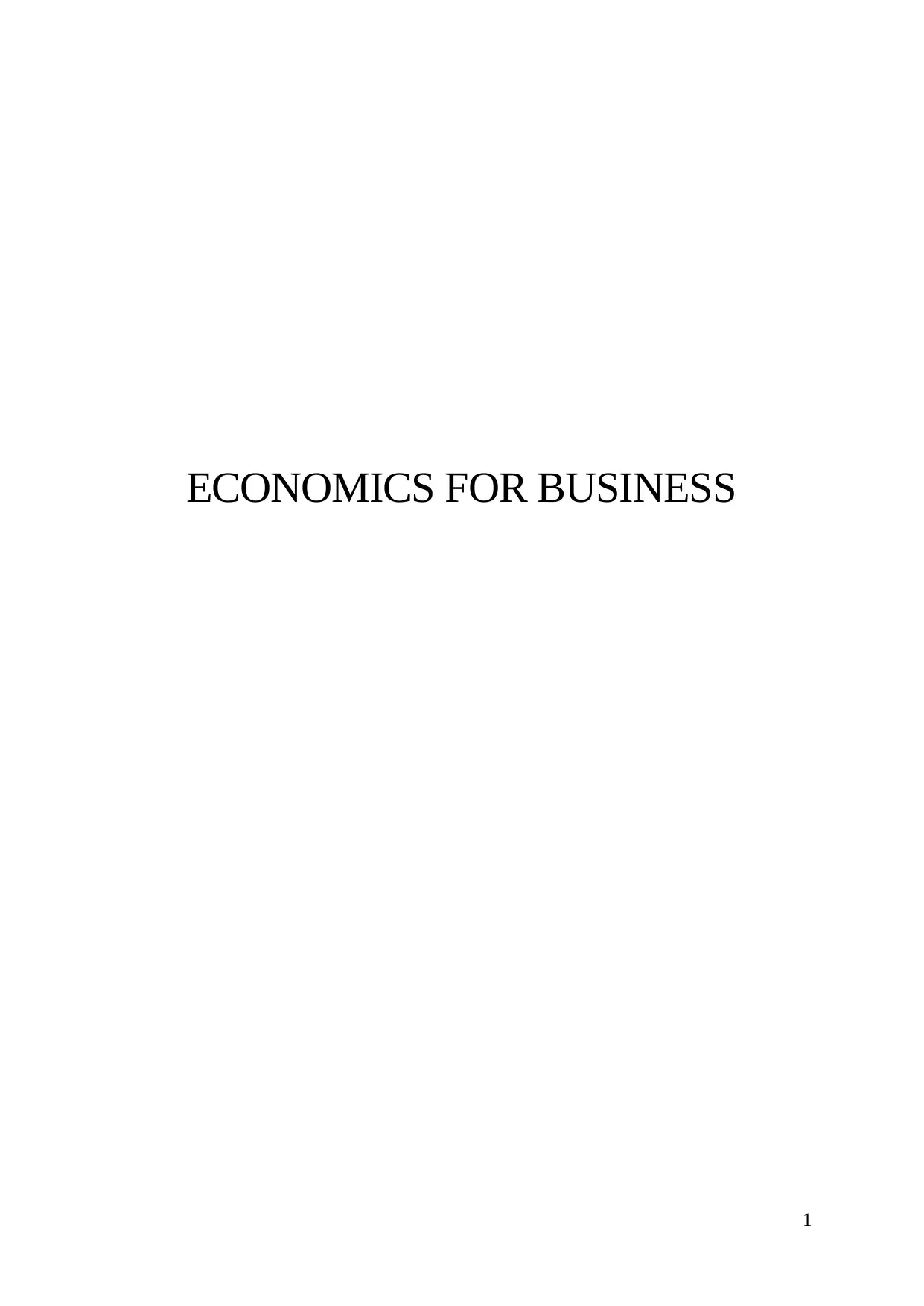
ECONOMICS FOR BUSINESS
1
1
Paraphrase This Document
Need a fresh take? Get an instant paraphrase of this document with our AI Paraphraser
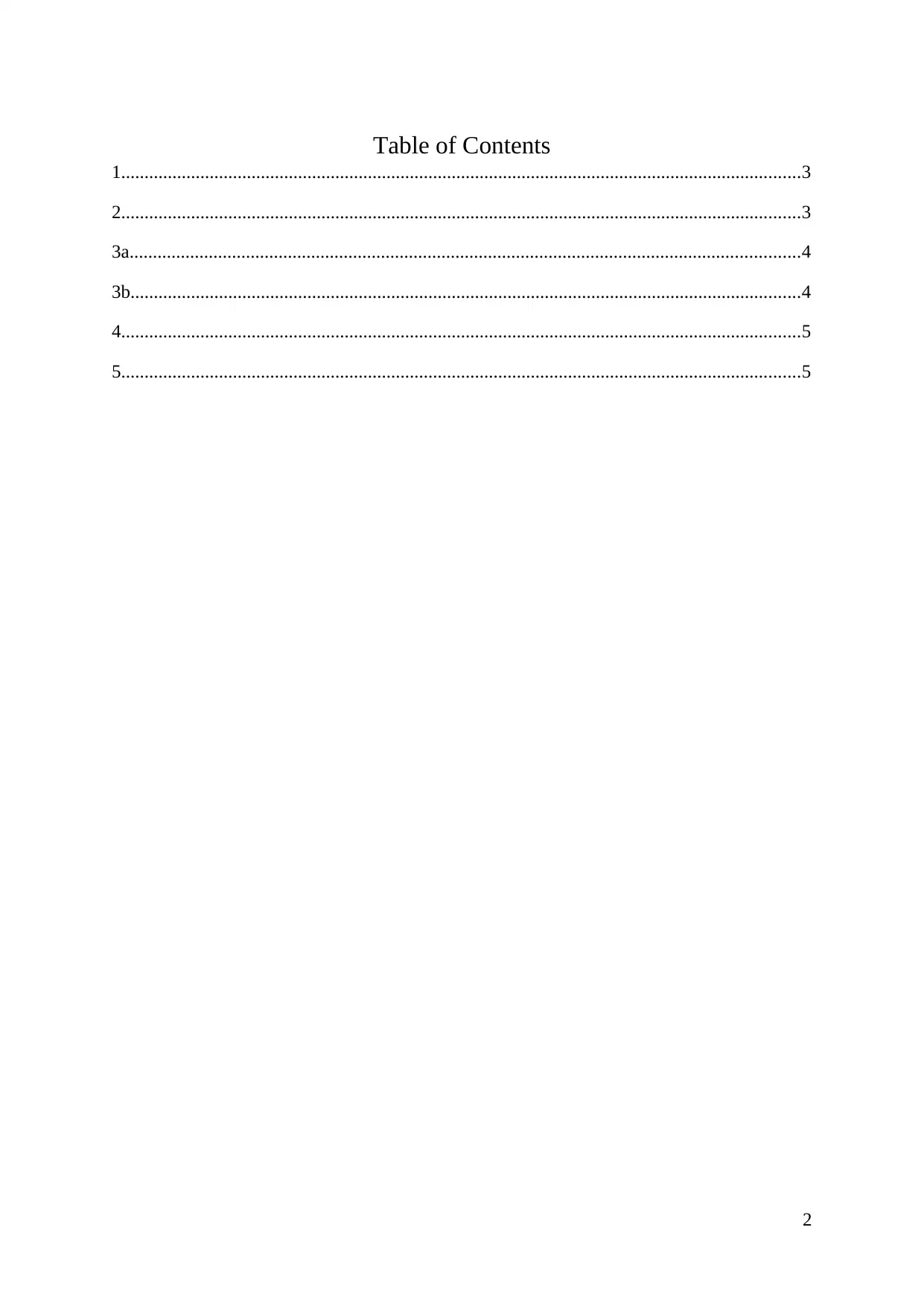
Table of Contents
1..................................................................................................................................................3
2..................................................................................................................................................3
3a................................................................................................................................................4
3b................................................................................................................................................4
4..................................................................................................................................................5
5..................................................................................................................................................5
2
1..................................................................................................................................................3
2..................................................................................................................................................3
3a................................................................................................................................................4
3b................................................................................................................................................4
4..................................................................................................................................................5
5..................................................................................................................................................5
2
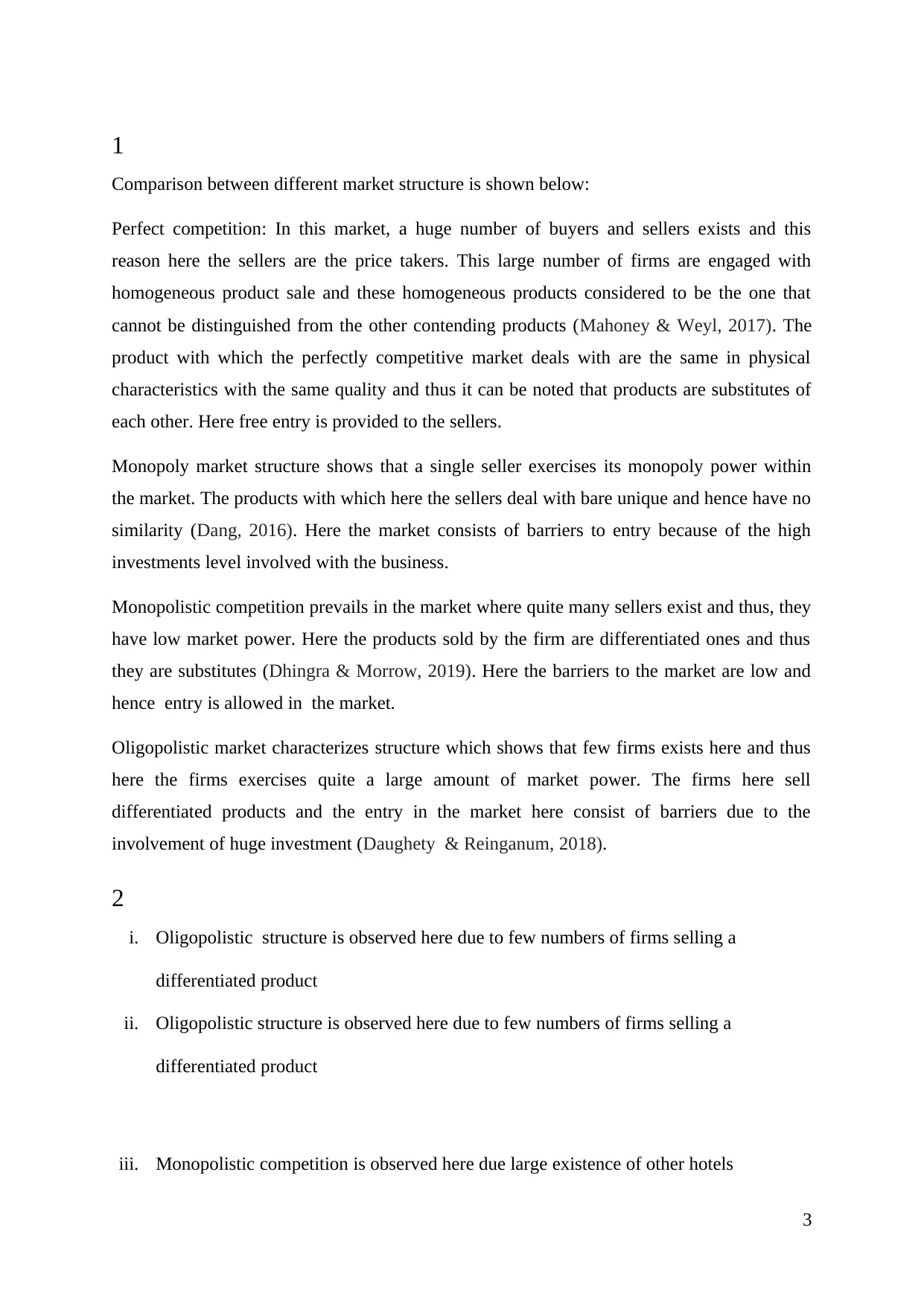
1
Comparison between different market structure is shown below:
Perfect competition: In this market, a huge number of buyers and sellers exists and this
reason here the sellers are the price takers. This large number of firms are engaged with
homogeneous product sale and these homogeneous products considered to be the one that
cannot be distinguished from the other contending products (Mahoney & Weyl, 2017). The
product with which the perfectly competitive market deals with are the same in physical
characteristics with the same quality and thus it can be noted that products are substitutes of
each other. Here free entry is provided to the sellers.
Monopoly market structure shows that a single seller exercises its monopoly power within
the market. The products with which here the sellers deal with bare unique and hence have no
similarity (Dang, 2016). Here the market consists of barriers to entry because of the high
investments level involved with the business.
Monopolistic competition prevails in the market where quite many sellers exist and thus, they
have low market power. Here the products sold by the firm are differentiated ones and thus
they are substitutes (Dhingra & Morrow, 2019). Here the barriers to the market are low and
hence entry is allowed in the market.
Oligopolistic market characterizes structure which shows that few firms exists here and thus
here the firms exercises quite a large amount of market power. The firms here sell
differentiated products and the entry in the market here consist of barriers due to the
involvement of huge investment (Daughety & Reinganum, 2018).
2
i. Oligopolistic structure is observed here due to few numbers of firms selling a
differentiated product
ii. Oligopolistic structure is observed here due to few numbers of firms selling a
differentiated product
iii. Monopolistic competition is observed here due large existence of other hotels
3
Comparison between different market structure is shown below:
Perfect competition: In this market, a huge number of buyers and sellers exists and this
reason here the sellers are the price takers. This large number of firms are engaged with
homogeneous product sale and these homogeneous products considered to be the one that
cannot be distinguished from the other contending products (Mahoney & Weyl, 2017). The
product with which the perfectly competitive market deals with are the same in physical
characteristics with the same quality and thus it can be noted that products are substitutes of
each other. Here free entry is provided to the sellers.
Monopoly market structure shows that a single seller exercises its monopoly power within
the market. The products with which here the sellers deal with bare unique and hence have no
similarity (Dang, 2016). Here the market consists of barriers to entry because of the high
investments level involved with the business.
Monopolistic competition prevails in the market where quite many sellers exist and thus, they
have low market power. Here the products sold by the firm are differentiated ones and thus
they are substitutes (Dhingra & Morrow, 2019). Here the barriers to the market are low and
hence entry is allowed in the market.
Oligopolistic market characterizes structure which shows that few firms exists here and thus
here the firms exercises quite a large amount of market power. The firms here sell
differentiated products and the entry in the market here consist of barriers due to the
involvement of huge investment (Daughety & Reinganum, 2018).
2
i. Oligopolistic structure is observed here due to few numbers of firms selling a
differentiated product
ii. Oligopolistic structure is observed here due to few numbers of firms selling a
differentiated product
iii. Monopolistic competition is observed here due large existence of other hotels
3
⊘ This is a preview!⊘
Do you want full access?
Subscribe today to unlock all pages.

Trusted by 1+ million students worldwide
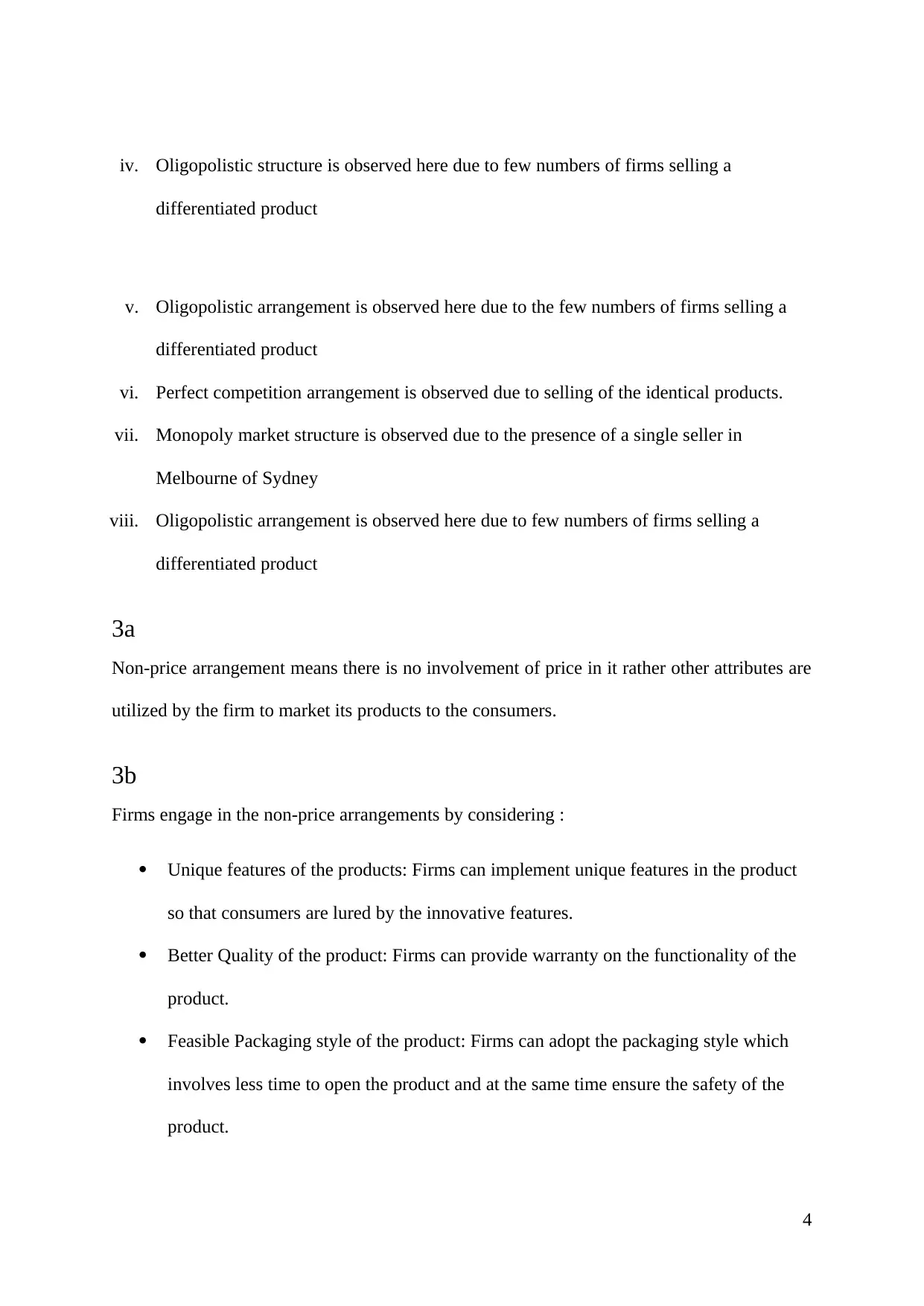
iv. Oligopolistic structure is observed here due to few numbers of firms selling a
differentiated product
v. Oligopolistic arrangement is observed here due to the few numbers of firms selling a
differentiated product
vi. Perfect competition arrangement is observed due to selling of the identical products.
vii. Monopoly market structure is observed due to the presence of a single seller in
Melbourne of Sydney
viii. Oligopolistic arrangement is observed here due to few numbers of firms selling a
differentiated product
3a
Non-price arrangement means there is no involvement of price in it rather other attributes are
utilized by the firm to market its products to the consumers.
3b
Firms engage in the non-price arrangements by considering :
Unique features of the products: Firms can implement unique features in the product
so that consumers are lured by the innovative features.
Better Quality of the product: Firms can provide warranty on the functionality of the
product.
Feasible Packaging style of the product: Firms can adopt the packaging style which
involves less time to open the product and at the same time ensure the safety of the
product.
4
differentiated product
v. Oligopolistic arrangement is observed here due to the few numbers of firms selling a
differentiated product
vi. Perfect competition arrangement is observed due to selling of the identical products.
vii. Monopoly market structure is observed due to the presence of a single seller in
Melbourne of Sydney
viii. Oligopolistic arrangement is observed here due to few numbers of firms selling a
differentiated product
3a
Non-price arrangement means there is no involvement of price in it rather other attributes are
utilized by the firm to market its products to the consumers.
3b
Firms engage in the non-price arrangements by considering :
Unique features of the products: Firms can implement unique features in the product
so that consumers are lured by the innovative features.
Better Quality of the product: Firms can provide warranty on the functionality of the
product.
Feasible Packaging style of the product: Firms can adopt the packaging style which
involves less time to open the product and at the same time ensure the safety of the
product.
4
Paraphrase This Document
Need a fresh take? Get an instant paraphrase of this document with our AI Paraphraser
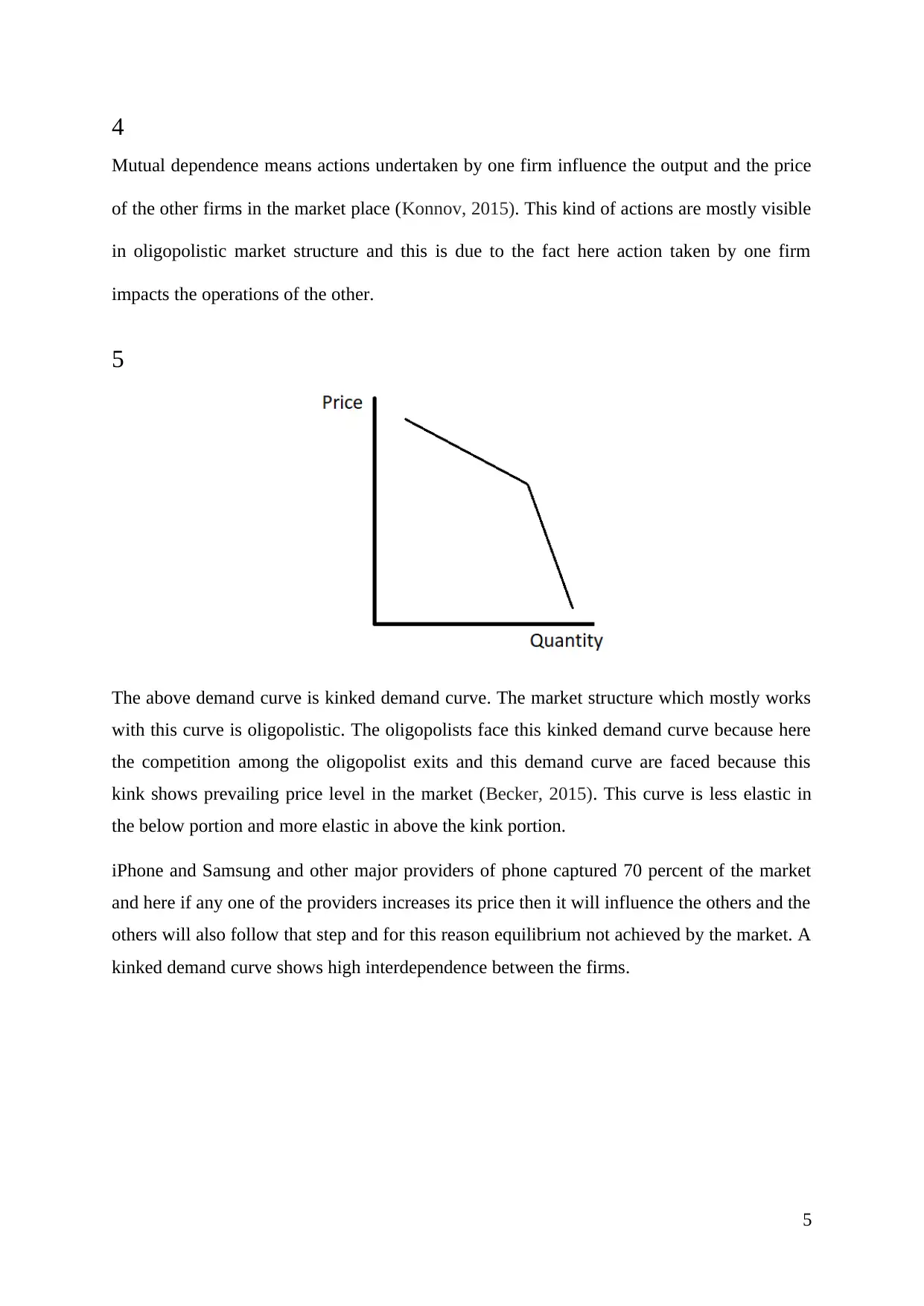
4
Mutual dependence means actions undertaken by one firm influence the output and the price
of the other firms in the market place (Konnov, 2015). This kind of actions are mostly visible
in oligopolistic market structure and this is due to the fact here action taken by one firm
impacts the operations of the other.
5
The above demand curve is kinked demand curve. The market structure which mostly works
with this curve is oligopolistic. The oligopolists face this kinked demand curve because here
the competition among the oligopolist exits and this demand curve are faced because this
kink shows prevailing price level in the market (Becker, 2015). This curve is less elastic in
the below portion and more elastic in above the kink portion.
iPhone and Samsung and other major providers of phone captured 70 percent of the market
and here if any one of the providers increases its price then it will influence the others and the
others will also follow that step and for this reason equilibrium not achieved by the market. A
kinked demand curve shows high interdependence between the firms.
5
Mutual dependence means actions undertaken by one firm influence the output and the price
of the other firms in the market place (Konnov, 2015). This kind of actions are mostly visible
in oligopolistic market structure and this is due to the fact here action taken by one firm
impacts the operations of the other.
5
The above demand curve is kinked demand curve. The market structure which mostly works
with this curve is oligopolistic. The oligopolists face this kinked demand curve because here
the competition among the oligopolist exits and this demand curve are faced because this
kink shows prevailing price level in the market (Becker, 2015). This curve is less elastic in
the below portion and more elastic in above the kink portion.
iPhone and Samsung and other major providers of phone captured 70 percent of the market
and here if any one of the providers increases its price then it will influence the others and the
others will also follow that step and for this reason equilibrium not achieved by the market. A
kinked demand curve shows high interdependence between the firms.
5
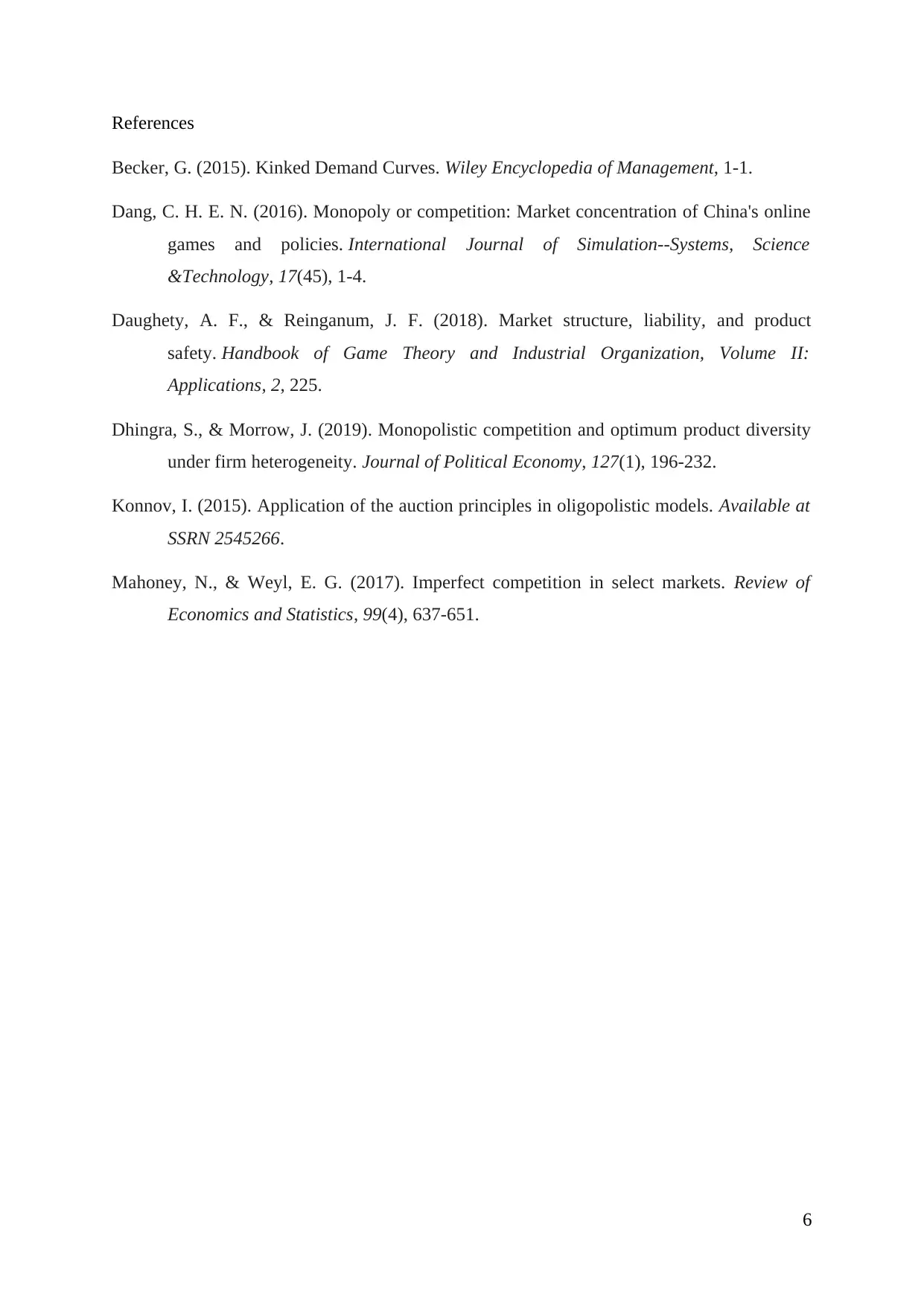
References
Becker, G. (2015). Kinked Demand Curves. Wiley Encyclopedia of Management, 1-1.
Dang, C. H. E. N. (2016). Monopoly or competition: Market concentration of China's online
games and policies. International Journal of Simulation--Systems, Science
&Technology, 17(45), 1-4.
Daughety, A. F., & Reinganum, J. F. (2018). Market structure, liability, and product
safety. Handbook of Game Theory and Industrial Organization, Volume II:
Applications, 2, 225.
Dhingra, S., & Morrow, J. (2019). Monopolistic competition and optimum product diversity
under firm heterogeneity. Journal of Political Economy, 127(1), 196-232.
Konnov, I. (2015). Application of the auction principles in oligopolistic models. Available at
SSRN 2545266.
Mahoney, N., & Weyl, E. G. (2017). Imperfect competition in select markets. Review of
Economics and Statistics, 99(4), 637-651.
6
Becker, G. (2015). Kinked Demand Curves. Wiley Encyclopedia of Management, 1-1.
Dang, C. H. E. N. (2016). Monopoly or competition: Market concentration of China's online
games and policies. International Journal of Simulation--Systems, Science
&Technology, 17(45), 1-4.
Daughety, A. F., & Reinganum, J. F. (2018). Market structure, liability, and product
safety. Handbook of Game Theory and Industrial Organization, Volume II:
Applications, 2, 225.
Dhingra, S., & Morrow, J. (2019). Monopolistic competition and optimum product diversity
under firm heterogeneity. Journal of Political Economy, 127(1), 196-232.
Konnov, I. (2015). Application of the auction principles in oligopolistic models. Available at
SSRN 2545266.
Mahoney, N., & Weyl, E. G. (2017). Imperfect competition in select markets. Review of
Economics and Statistics, 99(4), 637-651.
6
⊘ This is a preview!⊘
Do you want full access?
Subscribe today to unlock all pages.

Trusted by 1+ million students worldwide
1 out of 6
Related Documents
Your All-in-One AI-Powered Toolkit for Academic Success.
+13062052269
info@desklib.com
Available 24*7 on WhatsApp / Email
![[object Object]](/_next/static/media/star-bottom.7253800d.svg)
Unlock your academic potential
Copyright © 2020–2026 A2Z Services. All Rights Reserved. Developed and managed by ZUCOL.





